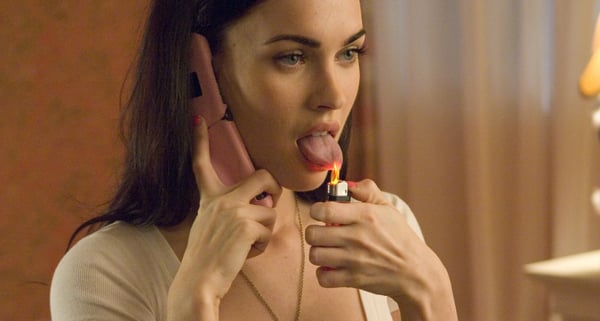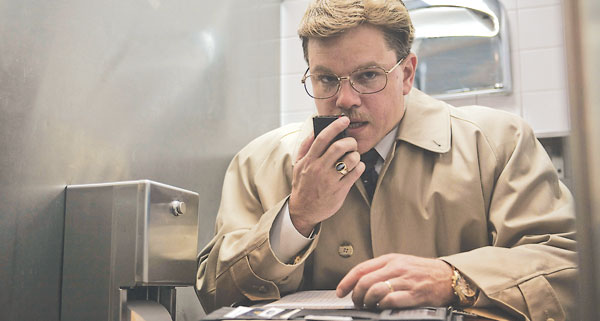Opening Weekend: Shape shifting with Megan Fox and Matt Damon
Reviews of ‘Jennifer’s Body’ and ‘The Informant!’ plus an interview with director Steven Soderbergh
Share

Jennifer’s Body: Written by Diablo Cody (Juno), and starring Megan Fox as —who acts like Angelina Jolie in her Billy Bob Thornton phase—Jennifer’s Body throws a feminist kink into the old blonde/brunette, saint/slut high-school horror movie formula. Evil arrives in the form of an indie rock band called Low Shoulder, which comes to the town of Kettle Falls and commits a cult murder to achieve stardom. Fox is, well, a fox, and teenage boys all over North America will be trying to sneak in under the film’s R rating to drool over her. The sex is strictly soft-core (no nudity, boys). But there’s a long, lingering lesbian kiss, framed in profile as extreme-close-up, between Fox and co-star Amanda Seyfried. And while Fox devours her flesh-eating role with great gusto, Seyfried’s performance is the film’s revelation. She plays the good-girl heroine opposite Fox’s carnal cannibal. But in a modern twist on the formula, this sweet blond is far from virginal. She knows her way around a condom, and may even be having more sex than the bad girl. Seyfried also stars in Atom Egoyan’s Chloe, where she gives a dynamite performance in a shape-shifting role as a hooker that allows her to demonstrate remarkable range.

The Informant: But Steven Soderbergh offers an offbeat spin on the whistle-blower genre with a . In this true story of corporate corruption, a transformed Matt Damon—wearing a dorky moustache, a toupee and an extra 20 pounds—plays Mark Whitacre, an agri-biz honcho who became the highest-ranking whistle-blower in U.S. history during the late ’90s. Whitacre exposes an international price-fixing conspiracy involving a corn product called lysene. But while wearing a wire for the FBI, and entertaining Mission Impossible delusions of grandeur, our hero is spinning his own elaborate web of lies, and embezzling millions from the company he’s ratting on. It’s hard to get too worked up about price fixing—unlike The Insider or Soderbergh’s own Erin Brockovich, this is an investigative tale of a scandal with no clear human toll. No one’s getting cancer. But it’s a fascinating story, an onion-skin narrative of lies compounded upon lies. Screenwriter Scott Z. Burns, who based his script the best-selling non-fiction book by Kurt Eichenwald, wisely milks the material for absurdist comedy. An inspired touch is Whitacre’s stream whimsical internal internal monologue. With his boyish, gee-whiz enthusiasm, Damon is well cast for the role: no matter how many times his character lies, we can’t help but believe him.
Before The Informant! premiered at the TIFF, I interviewed Steven Soderbergh by phone from Los Angeles. Here is a partial transcript of our talk:
Q: The last investigative movie you did about corporate crime was Erin Brockovich; this is a very different beast.
A: I was thinking more of The Insider because of the world this movie occupies. I thought of it as the definitive whistle-blower movie. And I was thinking of how we were going to distinguish ourselves from it. I didn’t know where should to take it. I thought maybe we should consider making this a comedy for a couple of reasons. It would immediately separate us from that film and others like it. Also it’s got one of the best building blocks of a comedy—the lie that escalates and gets out of control. And thirdly, the behavior—in reading the book there were times were I would just gasp and put it down. The things he was doing were so insane. I told Scott [screenwriter Scott Z. Burns, the straight version of this isn’t going to work. That’s when Scott started talking about the voice-over [Matt Damon’s zany internal monologue].
Q: How did Matt Damon get involved?
A: We sent him the book in 2001. He immediately read it and recognized it as one of a handful of roles you’re going to get in a career that he’s really excited about, that’s going to allow him to run down the field as fast as you can. Matt doesn’t make decisions about what to do based on money. If he wants to do something, he’ll do it. And if he doesn’t want to do something, he won’t do it. They’re talking about a Bourne 4. I’m telling you right now, his attitude is: ‘If there’s not a script I like, I’m not doing it.’
Q: Traditionally ‘whistleblower movies have a moral thrust—to expose the horror of corporate wrong-doing. But The Informant! has a different agenda.
A: Nobody was being killed. The stakes were a little different. It was easier to abstract it. Now I’m really glad we made it a comedy. Because you’re seeing the straight version in the paper every day. This kind of takes the mickey out of it a little.
Q: Was the recession already underway when you were shooting?
A: Some of the banks were starting to teeter. That was starting to play out while we were shooting. But the script was sitting there for six years. And the business that I’m in has changed to the extent that I don’t think I could get this movie made right now. This was green-lit two years ago. The business is getting more conservative. We sort of snuck this one, because it was cheap. Everybody was going: for $22 million we wont get burned too badly if it doesn’t work. Now with this approach and the fact that Matt’s the only marquee name in it, I think you’d have a really tough time.
Q: It’s odd. For a movie scripted six years ago, The Informant! seems incredibly timely. And with movies at TIFF like Up in the Air and Solitary Man [which Soderbergh produced], the landscape seems to be littered with masters of the universe who fall from a great height. What’s going on?
A: You walk into a buzzsaw when you try to articulate the zeitgeist. But I do think people are in general are responding to the mixed signals that they get culturally. When you look in the paper and you see how things are playing out, it’s difficult to determine what is the line exactly of behavior in our culture and in the world today. I see people getting rewarded in certain way in one area and then been punished in another area. There’s a lot of hypocrisy about. There’s no such thing as a serious debate any more. It’s just people screaming at each other, and that creates a lot of tension and a lot of confusion.
Q: You’re talking about the health care debate?
A: It’s shocking to watch so many people act against their own self interest. ealth care is not being debated here. What’s happening is the republicans desperately need Obama to fail. What are the arguments for me being a model citizen when I see this kind of thing playing out?
Q: The Informant! was produced by Participant Productions, who backed films like An Inconvenient Truth and Good Night and Good Luck. Is there always a political agenda in the films they do?
A: There has to be, but they have a wide net that they’re casting. In this case, to talk about whistle-blowing, the legislation that effects people who become whistle-blowers is really important legislation. There’s a sense that these people aren’t being protected. I’m sure that there are stories of whistle-blowers that end happily, but my impression is that they don’t. Their lives are changed in ways that are irrevocable and not necessarily positive. Think of that woman who after 9/11 who said there’s all this stuff going on in flight schools. That woman was vilified.
Q: Is lying more interesting than truth-telling?
A: Of course, because it’s more complicated than the truth. There’s no question that lying has a role our lives. It’s just a fact that if you were to walk around all day every day saying the absolute truth, someone will eventually kill you, literally. Lying performs a function. So the discussion becomes about gradation, the difference between ‘no, I didn’t steal that money’ and ‘that dress looks great on you.’
Q: How honest is the corporate culture in Hollywood?
A: I’ll tell you this, for all the jokes that are made at the expense of the entertainment industry, the economics of it are extremely transparent. You have too many people who have legal access to all the documentation regarding the economics of a given project for them to hide shit. Plus they’re all publicly traded companies. Economically it’s a very clean engine. Here’s why. You can’t say a movie made $300 million unless it did. It’s reported.
Q: How is the current economic climate going to affect what we see onscreen?
A: I look around at the landscape, at what’s going on right now, and I feel we’re entering a period of couple of years where there are not going to be a lot of good movies. It’s going to be very difficult to get good stuff made for quite a while.
Q. But the blockbusters are doing well at the box office.
A: In studio filmmaking, there’s this weird dead zone between $25 and $75 million. If you look at the return on investment dollar for dollar, if you’re a studio, it’s movies that are under $25 million and over $75 million. We’re entering a lean economic environment, and what’s happening with the internet, piracy is not a small thing for us. It’s a real problem and it’s getting worse. You get a situation where people are risk averse. You don’t see evolution in an environment that’s playing it safe. That’s the problem. Fear is not good for art.
Q: Where does that leave you?
I don’t have anything currently planned that’s really that big. Most of the stuff I’m looking at right now is under $30 million. And there’s stuff way under that in the Girlfriend Experience range [$1-2 million]. That’s because I haven’t been able to identity anything large scale that I feel as engaged by as the Oceans movies, which I really had a lot of fun making. interested in. I’d like to able to find another tent pole; I just haven’t found anything that I’m good for.
Q: How important is commercial success to you? When you take creative risks with a film like The Good German and it bombs, does that discourage you?
A: Only in that it means anyone behind me trying to do anything out of the box is going to get the door slammed in his face. I feel bad about that—I got tackled before I even ran the ball a yard. But I don’t think anybody in the studio world looks at Che and thinks that’s a black mark on my career. They’ll say that’s an ambitious film that’s never going to make scads of money because of what it is. I don’t think anyone looks at it and wants to punish me for it. But if you make a studio movie for a certain amount of money and it tanks, there’s a little staying-after-school for that. The Informant! will be an interesting test case. Warners are very bullish on the movie. They really like it and they’re going wider with it than we ever discussed during the making of it. I hope they’re right. Because if they’re not, that not only affects me, it affects anyone in a similar situation with a movie that’s not straight down the middle.